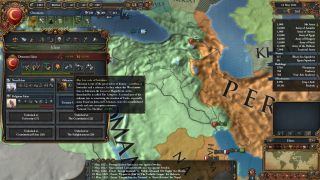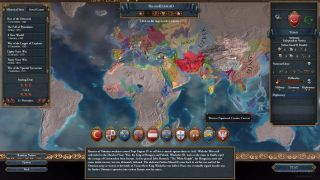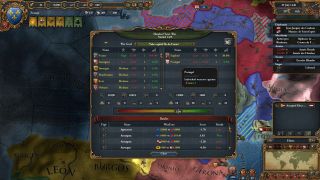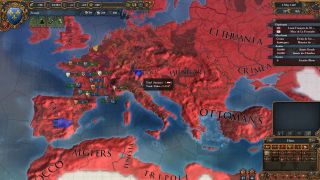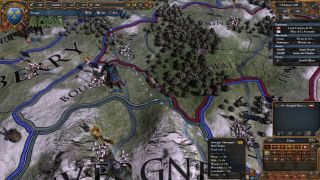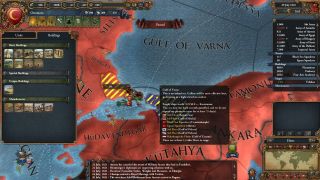I have played the Europa Universalis series since the second title was launched and I my imagination was quickly captured by the idea of taking full control of one nation in order to try and make it a bigger and more powerful empire than the real-world United Kingdom during the period.
Since then, the franchise has evolved in many ways and one of the biggest challenges for Europa Universalis IV is to keep the majesty of the grand strategy genre without making it all but impossible for newcomers to understand the core mechanics.
The team at Paradox Development Studios has managed to create a deep and complex game that accommodates a number of different play styles and will certainly have players spend hours trying to accurately guide their favorite nation through history.
Story
Europa Universalis IV offers choices, both when it comes to initial faction selection and to how you steer it through history.
The game does not adhere to real-world events and trends because that would eliminate the fun element of the experience and would limit the freedom of the player.
At the same time, there are more historical choices and events in the current version of the game than in the previous one, which introduces quite a bit of flavor to the experience and might even serve to educate some players about what actually happened a few hundred years ago.
Paradox seems to have managed to strike a good balance between giving each country a clear character, mostly via their national ideas and their flavor events, and making sure that players can enact major change as long as they want it.
There’s less narrative in Europa Universalis IV than in Crusader Kings II (from which you can elect to transfer a saved game you particularly like) but the stories that emerge from a game are more majestic because they feature whole nations rather than just individuals.
Gameplay
Europa Universalis IV begins with a country selection and from then on, the player can choose his own objectives and the routes he is ready to travel in order to reach them.
The game allows players to start wars, mediate between other countries, develop colonial empires, convert heathens to true faiths or accumulate huge wealth, all of this while developing new technology, recruiting great persons and generals and dealing with internal development.
Structure is provided by the National Ideas and by the various missions that Paradox has implemented, but long-term goals are fundamentally player defined, which makes playing as even a small country an interesting choice.
One of the biggest changes is linked to trade, which is now more organic and has mechanics that offer some advantages to those countries that sit where natural networks have actually developed in the real world.
Territorial control and good use of fleet are required to get money from trade, which can be crucial to factions like Venice, although gold plays a smaller overall role in Europa Universalis IV.
Its replacement in terms of importance are diplomatic, administrative and military points that are generated by the faction and can be used to discover new technology, power certain actions, hire advisors and increase stability.Knowing when to spend and when to accumulate them is one of the core skills one needs to learn to be effective in EU IV.
It’s also important to choose a few categories and focus on them because a very small number of countries can support wars, colonization and a trade focus at the same time.
Europa Universalis IV also brings big changes to diplomatic actions, to the way peace is re-introduced after a war and to the balance of power that can be created via coalitions.
Warfare is also subtly different, with sieges now harder to conduct before solid artillery is brought to the field and with a smaller number of ping pong battles.
I am also happy to report that the A.I. seems pretty solid and quickly works to expand as long as it has space and to consolidate when the player seems threatening.
Europa Universalis IV has an immensely improved hint system as well, which delivers a constant stream of information about the core mechanics of the game and the various ways players can use them, offering an invaluable resource for those new to the game.
There are also tutorials but it seems to me that learning is easier when playing a full campaign using a strong nation like England or France.
Graphics and audio
Europa Universalis IV is certainly not the kind of video game that will be played because it changes the paradigm when it comes to render technology or because it stresses modern computers to the breaking point.
But the team has done a good job of making the entire world feel a little more interesting, with small improvements to animations and to the look of the buildings and terrain.
The interface and the various map modes (click on the lower right hand part of the screen to get access to more) are also very helpful because they quickly deliver a lot of information that’s easy to understand, a crucial feature for a game that’s so complex.I also like the soundtrack of Europa Universalis IV and I plan to actually listen to it while playing the game until I get to know each track, at which point my classic music compilation will take its rightful place in my grand strategy routine.
Multiplayer
32 players can now play Europa Universalis IV at the same time in a multiplayer session and filling all the slots probably creates an immensely fun experience.
I lack the ability to bring so many friends to the game but even with a few other gamers and a lot of time, the game evolves into a beat that’s very different from the single player.
The focus shifts from simply making good management decisions to thinking about how to create alliances and which computer nations would make good targets for conquest before one of the human players makes a mistake and becomes a target.
The network infrastructure for Europa Universalis IV seems solid and it will be interesting to see how popular the mode is with the community, considering how much the development team has invested in it.
The mechanics that Paradox is introducing in the new installment of the series make a lot of sense for veterans and will also offer a smoother experience for those who are just now discovering the attractions of the grand strategy experience. I have some concerns about the learning curve, which seems to be as steep as ever despite the best efforts of the development team, but that’s counterbalanced by the bigger focus on multiplayer, which gives veterans a simple way of teaching others the main ideas behind EU IV. I love the way I can pick any country, get a feel for the best suited route through the ages by looking at its ideas and at its starting situation and then quickly decide how I want to play and what action I need to perform to achieve my objectives. Then, the game throws its first curveball, I adapt and then we repeat this lovely cerebral dance until either I am satisfied with my result or I quit in order to start over as a new nation.
The Good
The Bad
Conclusion
 14 DAY TRIAL //
14 DAY TRIAL // 
